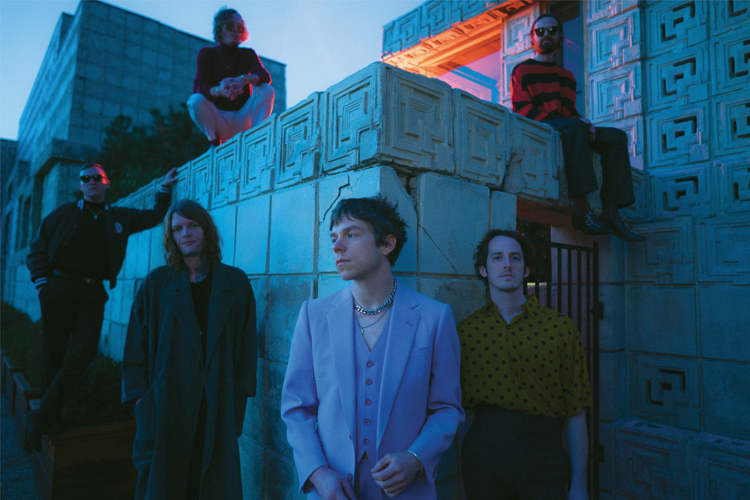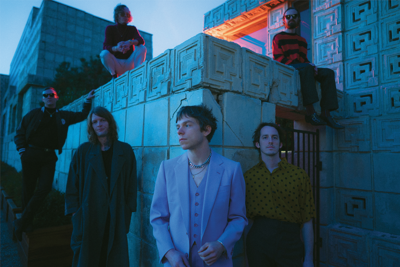
Cage the Elephant’s Tell Me I’m Pretty was a critical and commercial breakthrough for the Bowling Green, Ky.-bred sextet. Released in December 2015, the Dan Auerbach-produced record netted them a Grammy for Best Rock Album and earned them widespread critical acclaim as they grew their international fan base. It was a triumphant time for the group, but following the album’s release, lead singer Matt Shultz saw his life outside of the band grow increasingly difficult. Those challenges provide the foundation for Cage the Elephant’s fifth studio album, Social Cues. Out Friday, the LP takes stock of painful changes in Shultz’s personal life — including the end of his seven-year marriage and the loss of two friends to suicide — while further pushing the boundaries of the band’s sonic palette.
Cage the Elephant recorded Social Cues in their adopted hometown of Nashville (with sessions at Battle Tapes Recording, Sound Emporium and Blackbird Studio) and in Los Angeles (at The Village Studios) with producer John Hill, known for his work with acts like Santigold and Portugal. The Man. While Tell Me I’m Pretty has a garage-y rawness to even its most complex moments, and Auerbach seemed to know just how much to sand down the group’s rough edges, Social Cues finds Cage the Elephant exploring more intricate arrangements and bringing influences like electronic pop, glam and even reggae closer to the front than before. Speaking with the Scene via phone, Shultz attributes both the more personal nature of the album’s lyrics and its musical experimentation to the band’s unyielding desire to grow as artists.
“With each record you make, you hope to learn something new and bring something new to the process, then incorporate that into the next record,” says Shultz. “We try with each record to become more and more transparent, kind of get rid of some of the creative baggage that we feel hinders creativity at large, at least for ourselves.”
While much of what the group struggles with is entirely musical, Shultz notes that his band’s growth is also about maintaining an honesty and vulnerability in his lyrics. Social Cues was also inspired by social anxiety and what Shultz describes as “unspoken legalism” in Western civilization, which he explains as a drive to make judgments about your own behavior based on the smallest details of what someone else is doing.
Anxiety is palpable across the album, often as much in the songs’ arrangements as in their lyrics. On opener “Broken Boy,” guitars skitter across a relentless beat as Shultz wails: “Broken boy / How does it feel? / How does it feel?” In “House of Glass,” the band plays with tension and release through understated verses, over which Shultz sings as though his jaw is clenched shut, before he breaks into a swaggering chorus. “Dance Dance” pairs woozy guitar riffs with drawling vocals to dizzying effect.

Another of Social Cues’ standout moments is “Night Running,” a hypnotic, grooving track with slight reggae undertones that features a guest appearance from genre-bending pop maestro Beck. His appearance on the album came about as something of a surprise, coordinated by Brad Shultz, who is Matt’s brother and one of Cage the Elephant’s guitarists.
“We’d had it pretty close to completion,” says Matt Shultz. “All the arrangements were finished, or most of it, the chorus was feeling pretty nice. We were just struggling to find a personality for the verses. Brad had a hunch that Beck would be the right person to find it, so he sent it off, not telling the rest of us. A day or two later Beck came back with verses, and it was just the right thing at the right time.”
Cage the Elephant is widely known for its energetic live performances, pushed to the limit by Matt Shultz’s stage diving and other antics, and the songs on Social Cues seem poised to make their sets even more electrifying. Like the fans who flock to the band’s concerts, he seems most excited by the possibilities offered by the live experience. To prepare for their upcoming tour, he’s spent the past few months learning new techniques.
“I’ve been doing this intensive [study] of different mediums for performance,” he says. “The one that took the most of my time is called butoh — it’s a Japanese dance. Then I did some modern dance. I’m excited to be more present in a more raw way, I suppose. I think in the past I had a lot of habits and impulses that weren’t 100 percent married to the music.”
One adjective you might use to describe the latest phase of Cage the Elephant’s evolution is “polished,” or maybe even “refined.” But that doesn’t mean you can call them stiff or disengaged.








